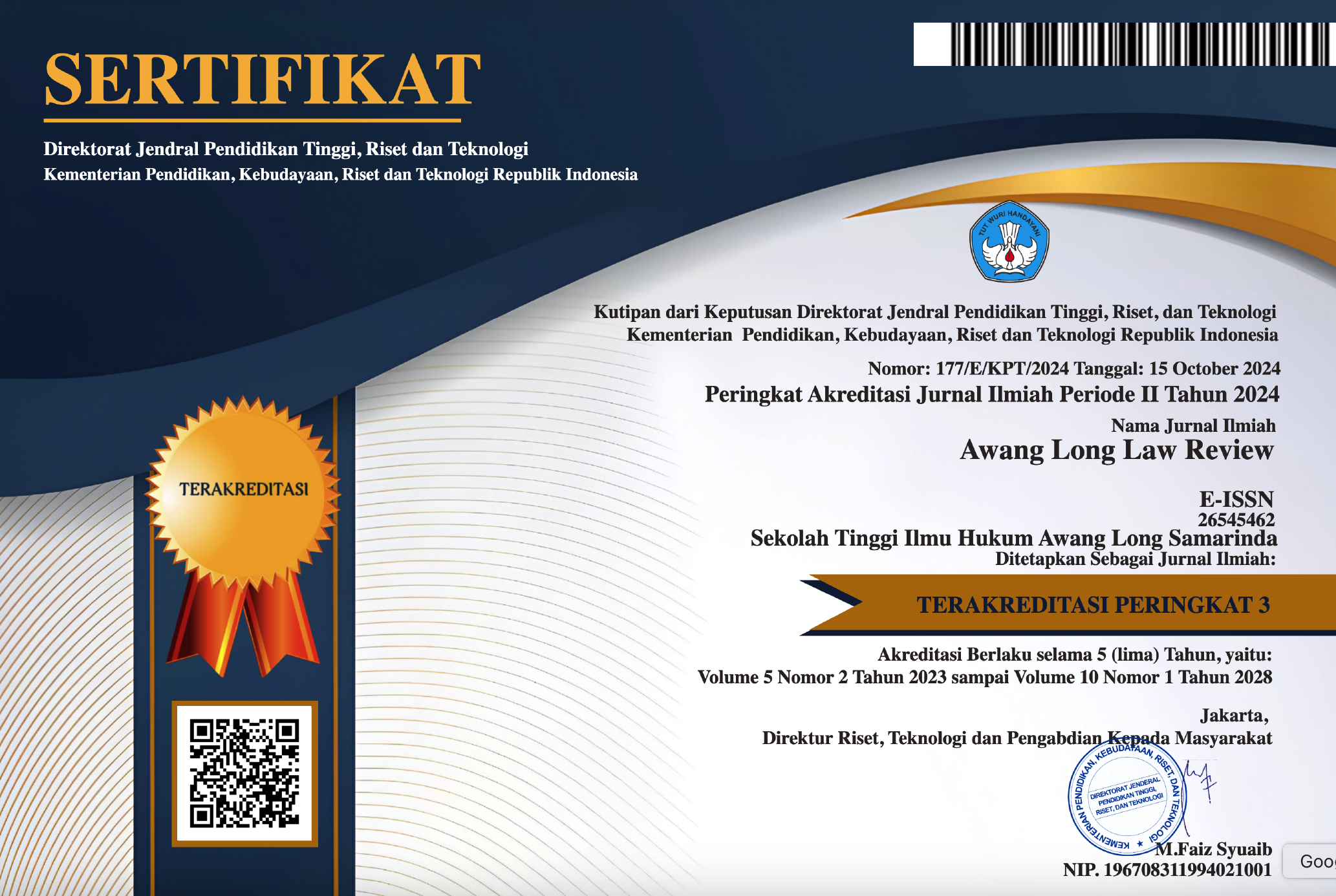COMPARATIVE ANALYSIS OF CORRUPTION CRIMINAL REGULATIONS BETWEEN THE NEW CRIMINAL LAW AND THE CORRUPTION ACT
Abstract
The National CC’s (NCC) ratification has completed the mission of establishing a NCC adequately through a legislative process on the development of codified criminal science and practice adapted to the conditions and characteristics of the Indonesian nation and state, which differed from legal politics during the Dutch colonial administration. It can br concluded from the results of the study that the regulation of corruption crimes between the Corruption Law and the NCC is still classified as an extraordinary crime, but there is a slight difference of increase/decrease in the minimum/maximum prison terms and fines. This is motivated by the implementation of the legal principle of proportional criminal responsibility. Then, the existence of Article 630 of the NCC is the implementation of legal preference Lex Generalis Derogate Legi Specialis and Lex Posteriori Derogat Legi Priori principles, when there is a double arrangement between the Corruption Law and the NCC. However, the NCC also applies the In Dubio Pro Reo principle, which means that when considering two regulations that govern the same case, the rule that is more advantageous to the suspect or defendant is used. By taking into account the provisions of Article 632 of the NCC that this Criminal Code shall come into effect 2 (two) years from the date of promulgation, this should be seen as the implementation of the Government's task to socialize this NCC to the whole community before it is enacted.
Downloads
References
Asir, S. (2022). Konsep Pembatalan Norma Hukum: (Studi Perbandingan Konsep Asas Lex Posteriori Derogat Legi Periori dan Konsep Nasikh Mansukh). Dinamika, 28(15), 5285-5300.
Badan Pembinaan Hukum Nasional. (2022). Rancangan Kitab Undang-Undang Hukum Pidana (final).
Eddy OS Hiariej, dkk. (2009). Persepsi dan Penerapan Asas Lex specialis derogat legi generali di Kalangan Penegak Hukum, Laporan Penelitian, Yogyakarta: Fakultas Hukum Universitas Gajah Mada.
Harruma, I. (2022, July 4). Sejarah KUHP dan Perjalanan Menuju KUHP Baru. KOMPAS.com. Retrieved December 21, 2022, from https://nasional.kompas.com/read/2022/07/05/01500051/sejarah-kuhp-dan-perjalanan-menuju-kuhp-baru
Indonesia Corruption Watch. (2022, August 2). Catatan Kritis Isu Pemberantasan Korupsi dalam RKUHP (draft 4 Juli 2022). Retrieved December 23, 2022, from https://antikorupsi.org/id/catatan-kritis-isu-pemberantasan-korupsi-dalam-rkuhp-draft-4-juli-2022
Mahkamah Agung. (2007). Putusan Kasasi Nomor 2175/K/Pid/2007
Mahkamah Agung. (2009). Putusan Kasasi Nomor 33 K/MIL/2009
Mahkamah Konstitusi. (2020). Putusan atas Permohonan Uji Materi Terhadap Undang-Undang Nomor 11 Tahun 2020 tentang Cipta Kerja Nomor Nomor 91/PUU-XVIII/2020.
Manullang, S. O., Kusumadewi, Y., Verawati, V., Siburian, H. K., Siburian, H., & Sipayung, B. (2023). Problematika Hukum atas Pembentukan Perubahan Kedua atas UU KPK. Journal on Education, 5(2), 4885-4897.
Manullang, S. O. (2021). Understanding the sociology of customary law in the reformation era: complexity and diversity of society in Indonesia. Linguistics and Culture Review, 5(S3), 16-26.
Manullang, S. O. (2020). Ciri-ciri Pelayanan Birokrasi yang Berkualiatas. Medan: Kita Menulis.
Nawawi Arief, B. (2012). Pidana Mati Perspektif Global, Pembaharuan Hukum Pidana dan Alternatif Pidana untuk Koruptor. Semarang: Penerbit Pustaka Magister.
Ni'am, S. (2022, December 7). Hukuman Koruptor dalam KUHP Baru Lebih Ringan Dibanding UU Pemberantasan Tipikor. Retrieved December 23, 2022, from https://nasional.kompas.com/read/2022/12/07/17332601/hukuman-koruptor-dalam-kuhp-baru-lebih-ringan-dibanding-uu-pemberantasan
ProCon.org. (2021, August 31). Federal Capital Offenses. Death Penalty. Retrieved December 12, 2022, from https://deathpenalty.procon.org/federal-capital-offenses/.
Republik Indonesia. (1945). Undang-Undang Dasar Negara Republik Indonesia.
Republik Indonesia. (1946). Undang-Undang Nomor 1 Tahun 1946 tentang Peraturan Hukum Pidana.
Republik Indonesia. (1958). Undang-Undang Nomor 73 Tahun 1958 tentang Menyatakan Berlakunya Undang-Undang No. 1 Tahun 1946 Republik Indonesia tentang Peraturan Hukum Pidana untuk Seluruh Wilayah Republik Indonesia dan Mengubah Kitab Undang-Undang Hukum Pidana.
Republik Indonesia. (1999). Undang-Undang Nomor 31 Tahun 1999 tentang Pemberantasan Tindak Pidana Korupsi sebagaimana telah diubah dengan Undang-Undang Nomor 20 Tahun 2001 tentang Perubahan atas Undang-Undang Nomor 31 Tahun 1999 tentang Pemberantasan Tindak Pidana Korupsi.
Republik Indonesia, Sekjen DPR. (2022, December 6). RKUHP Disahkan Menjadi UU, Lodewijk: Semoga Menjadi Tonggak Sejarah Baru Penegakan Hukum di Indonesia. Dewan Perwakilan Rakyat. Retrieved December 21, 2022, from https://www.dpr.go.id/berita/detail/id/42220/t/RKUHP+Disahkan+Menjadi+UU%2C+Lodewijk%3A+Semoga+Menjadi+Tonggak+Sejarah+Baru+Penegakan+Hukum+di+Indonesia
Republik Indonesia. (2023). Undang-Undang Republik Indonesia Nomor 1 Tahun 2023 tentang Kitab Undang-Undang Hukum Pidana.
Sipayung, B., & Ardiani, A. (2022). Manajemen Risiko Dalam Pertimbangan Pengajuan Pinjaman Dana Pemulihan Ekonomi Nasional (PEN) Daerah. KINERJA, 19(4), 666-677.
Sipayung, B., & Wahyudi, A. (2022). Penerapan Good Governance dalam Rangka Meningkatkan Kualitas Pelayanan Publik yang Berintegritas di Lingkungan Badan Pemeriksa Keuangan. Jurnal Pendidikan Tambusai, 6(2), 14323-14334.
Sipayung, B., Manullang, S. O., & Siburian, H. K. (2023). Penerapan Hukuman Mati Menurut Hukum Positif di Indonesia ditinjau dari Perspektif Hak Asasi Manusia. Jurnal Kewarganegaraan, 7(1), 134-142.
Sipayung, B., & Prasetyo, A. (2023). Audit atas Biaya Perkara dalam Laporan Keuangan Mahkamah Agung dan Badan Peradilan yang Berada di Bawahnya. EKALAYA: Jurnal Ekonomi Akuntansi, 1(1), 71-82.
Sucipta, P. R., Syahputra, I., & Sahindra, R. (2020). Lex specialis derogat legi generali Sebagai Asas Preferensi Dalam Kecelakaan Angkutan Laut Pelayaran Rakyat. Jurnal IUS Kajian Hukum dan Keadilan, 8(1), 140-150.
Sudarmanto, E., Sari, D. C., Nurmiati, N., Susanti, S. S., Syafrizal, S., Yendrianof, D., ... & Purba, B. (2020). Pendidikan Anti Korupsi: Berani Jujur. Yayasan Kita Menulis.
Suyanto, H. (1982). Hukum Acara Pidana. Zifatama Jawara.
Suyanto, S. (2018). Pengantar Hukum Pidana. Buku Pengantar Hukum Pidana.
Widyaningrum, H. (2020). Perbandingan Pengaturan Hukuman Mati di Indonesia dan Amerika Serikat. Volksgeist: Jurnal Ilmu Hukum Dan Konstitusi, 3(1), 99–115. https://doi.org/10.24090/volksgeist.v3i1.3777
Wikansari, R., Sayuti, M., Sipayung, B., Defitri, S. Y., & Luturmas, Y. (2023). Implementation of Integrated One Stop Model in Public Services: An Analysis of Human Resources Performance Competency Development in The Indonesian Government Sector. Multicultural Education, 9(01), 16-27.
Wikipedia. (2018). Asas Legalitas, diakses dari https://id.wikipedia.org/wiki/Asas_Legalitas, pada tanggal 02 Maret 2018 jam 19.00 WITA.
Copyright (c) 2023 Suyanto, Henry Kristian Siburian, Eko Setyo Nugroho Nugroho, Sardjana Orba Manullang, Baren Sipayung

This work is licensed under a Creative Commons Attribution-ShareAlike 4.0 International License.







